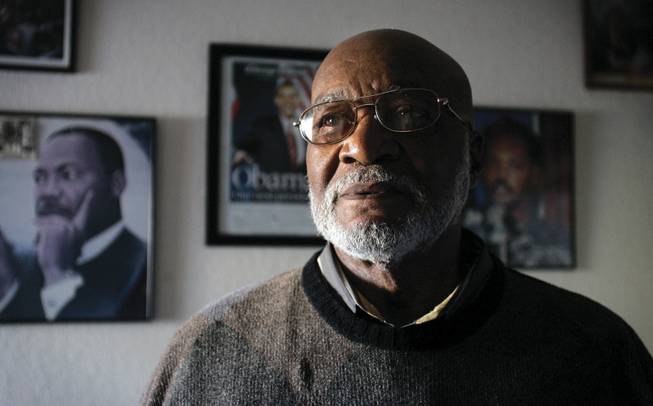
Samuel Coleman of Las Vegas, 80, who fought for labor standards and racial justice as a passenger-train waiter, was recently honored by Amtrak and a Chicago-based museum. He recalls that before the reforms, he and other black railway workers had to sleep in areas “with roaches, rats and hobos” because of prejudice.
Wednesday, Feb. 25, 2009 | 2 a.m.
Las Vegas retiree Samuel Coleman, 80, and some of his former fellow workers were recently honored by Amtrak and the Chicago-based A. Philip Randolph Pullman Porter Museum for their role in black history. His good name as a Chicago organizer also precedes him, as the Obama team found him and enlisted him and his wife in the door-to-door effort in the campaign.
What was it like working as a black waiter on the railroads decades before the civil rights era?
Because of prejudice, we had to sleep in a shed in Oakland, with roaches, rats and hobos. We couldn’t stay in hotels. Things were ugly. The white customers called each one of us “George,” taking away from us one of the only things that was completely ours — our names.
How did things change?
In the 1950s we met in Chicago with the Pullman porters union. They accepted us. We voted to join, and things started to get better. We could sleep in hotels. But it didn’t affect our salaries much. We were so far behind it was hard to catch up. When I started in 1944 I earned 38 cents an hour, plus tips. Twenty-five years later, it was 67 cents.
What else did you do to change conditions for blacks?
On the trains, I learned to read The Wall Street Journal and talk to people about money. I brought that back to my community. In Markham, Ill., where I lived, I formed a black investors club in the mid-1960s. It still exists.
How do you see young black people today?
They grow up with a different mentality. We didn’t wear our pants below our butts, for example. Sometimes I would like to put my arm around them and ask, “Young man, do you think your grandmother would like to see you like this?”
Why are there still issues like high incarceration rates for black males?
The court system is not fair. The police department is not fair. But also, kids don’t have fathers. Or if they have one, he doesn’t talk to them like they’re part of the family, using foul words.
What can be done?
I tell young black men, get involved. Help root out ugly things. We can help change mankind. Everything is possible. At one time, I didn’t think there would ever be a black senator, much less a black president.

Join the Discussion:
Check this out for a full explanation of our conversion to the LiveFyre commenting system and instructions on how to sign up for an account.
Full comments policy